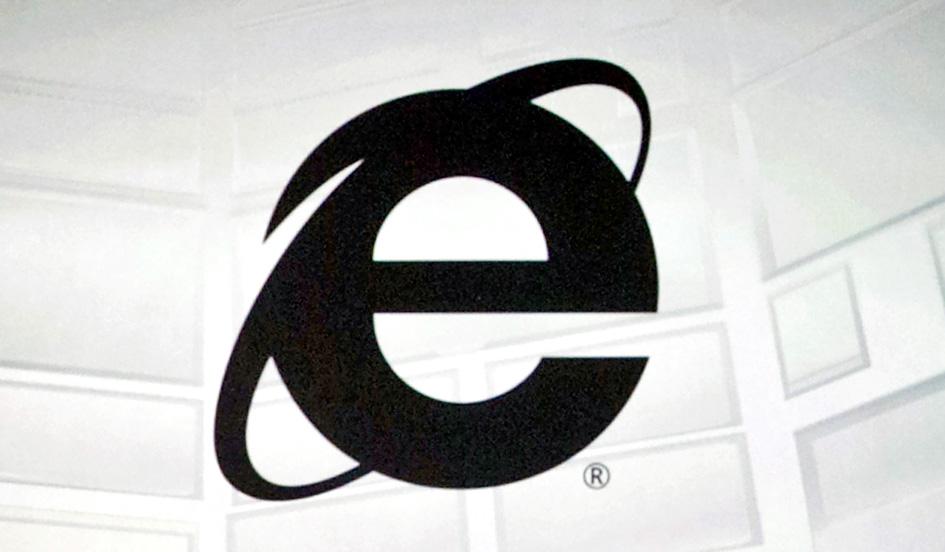Microsoft Corp yesterday finally retired its Internet Explorer (IE), putting an end to a quarter-century-old app, while also sparking a small panic among businesses and government agencies that built internal systems around the deprecated browser.
Japan might be the country most affected by the move, as a survey in March found that 49 percent of Japanese firms still use IE. Among them, the most common use was for in-house management, data exchange and accounting systems.
All of those should have been updated or transitioned to different software in the time since Microsoft announced its IE retirement plans a year ago, but the Nikkei reports that many procrastinated.

Photo: AP
Businesses across the country are having to move swiftly to ensure they can still run operations that previously relied on apps built atop Microsoft’s long-tenured browser.
Internet Explorer, once the globe’s dominant browser, fell out of favor with its IE6 version, which was marred by feature bloat and frustrating performance.
Faster and better browsers such as Google’s Chrome and Mozilla’s Firefox took over, and IE’s share of the worldwide market was a negligible 0.64 percent as of last month, Statcounter said.
Microsoft’s successor to IE, called Edge, is a browser built on the same basic platform as Chrome, called Chromium, and is thus compatible with Chrome extensions and supports much of the same functionality.
Microsoft has integrated an IE mode inside Edge, which it is to support for a while longer.

LIMITED IMPACT: Investor confidence was likely sustained by its relatively small exposure to the Chinese market, as only less advanced chips are made in Nanjing Taiwan Semiconductor Manufacturing Co (TSMC, 台積電) saw its stock price close steady yesterday in a sign that the loss of the validated end user (VEU) status for its Nanjing, China, fab should have a mild impact on the world’s biggest contract chipmaker financially and technologically. Media reports about the waiver loss sent TSMC down 1.29 percent during the early trading session yesterday, but the stock soon regained strength and ended at NT$1,160, unchanged from Tuesday. Investors’ confidence in TSMC was likely built on its relatively small exposure to the Chinese market, as Chinese customers contributed about 9 percent to TSMC’s revenue last

With this year’s Semicon Taiwan trade show set to kick off on Wednesday, market attention has turned to the mass production of advanced packaging technologies and capacity expansion in Taiwan and the US. With traditional scaling reaching physical limits, heterogeneous integration and packaging technologies have emerged as key solutions. Surging demand for artificial intelligence (AI), high-performance computing (HPC) and high-bandwidth memory (HBM) chips has put technologies such as chip-on-wafer-on-substrate (CoWoS), integrated fan-out (InFO), system on integrated chips (SoIC), 3D IC and fan-out panel-level packaging (FOPLP) at the center of semiconductor innovation, making them a major focus at this year’s trade show, according

DEBUT: The trade show is to feature 17 national pavilions, a new high for the event, including from Canada, Costa Rica, Lithuania, Sweden and Vietnam for the first time The Semicon Taiwan trade show, which opens on Wednesday, is expected to see a new high in the number of exhibitors and visitors from around the world, said its organizer, SEMI, which has described the annual event as the “Olympics of the semiconductor industry.” SEMI, which represents companies in the electronics manufacturing and design supply chain, and touts the annual exhibition as the most influential semiconductor trade show in the world, said more than 1,200 enterprises from 56 countries are to showcase their innovations across more than 4,100 booths, and that the event could attract 100,000 visitors. This year’s event features 17

Germany is to establish its first-ever national pavilion at Semicon Taiwan, which starts tomorrow in Taipei, as the country looks to raise its profile and deepen semiconductor ties with Taiwan as global chip demand accelerates. Martin Mayer, a semiconductor investment expert at Germany Trade & Invest (GTAI), Germany’s international economic promotion agency, said before leaving for Taiwan that the nation is a crucial partner in developing Germany’s semiconductor ecosystem. Germany’s debut at the international semiconductor exhibition in Taipei aims to “show presence” and signal its commitment to semiconductors, while building trust with Taiwanese companies, government and industry associations, he said. “The best outcome